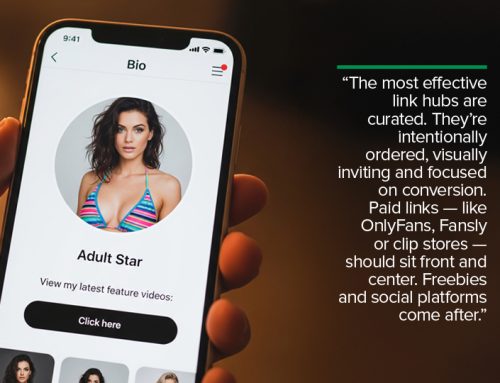For the average person, being on social media can be an easy way to express oneself, from sharing political beliefs to rooting for favorite sports teams and everything in between. It can be a way to connect with like-minded individuals and interact with others freely.
For content creators with VIP pages, being open like that on social media is a decision that has to be made very carefully. It can be hard to be labeled a sex worker, so for your own protection as well as your mental health, you want to be careful in choosing how much you share when you’re posting.
You don’t want to alienate parts of your fan base with controversial viewpoints but you also want to be true to yourself and present an authentic persona that makes you “you” to your fans. If you’re in the top percentile of performers, you may have a little more leeway and be able to share more than you would if you were a smaller earner. Not everyone can afford to offend a percentage of their fans and that’s okay! So, how do you decide what to share and how much?
WHO ARE YOU?
I want you to think of all of your pages as your adult-friendly “finsta” profile. From SFW socials to premium socials, you should have a clear idea of the personality you’re willing to share with your fans, be it close to your natural personality or very different from your everyday life.
You want to determine who you are in that regard because this is going to impact the kind of information you share with your fans. If you’re more of an “open book” kind of person, you might share more information about yourself than someone whose personality is more guarded. Look at what aspects of your life affect your choices as a performer and think about whether you’re willing to share that with hundreds, potentially thousands, of strangers.
Fans like to feel as if they get to know all of you, so it can be tempting to share information as if you’re a sibling, such as where you grew up, how religious or political you are, and so forth. These are intimate details, though, and you do not have to share anything that you aren’t comfortable talking about. It is important to remember that once this information about you is out there, it’s staying out there. The internet is forever.
So if you want to share personal information about yourself, make sure it’s not something that can be traced back to you or those around you. For instance, if you say you have an older sister, it’s not outside the realm of possibility that people may ask you more about her. And they may ask inappropriate questions. If you don’t want to deal with this possibility, don’t mention her.
If being raised in a religious home impacted your choice to get into sex work and you’re open about that, discuss it without naming specific details that can give you away, such as a particular place of worship you attended. Your goal should be to share information about yourself in a way that makes fans feel like you’re giving them everything, but you know it’s a tiny crumb.
“Every Sunday after Catholic school I’d go to a donut shop close by and get the most delicious maple old-fashioned!” you might say, so a fan feels as if you’re sharing intimate memories from your past, even though you’re not being overly specific.
WHERE ARE YOU GOING?
Another easy way to protect yourself is to avoid giving out specific locations in your neighborhood. If you’re in a large metropolitan area such as Los Angeles, you can probably post a photo with an In-N-Out sign safely, because that could be at any number of locations throughout the city. But if you’re from a smaller town and post a picture of the only family-owned Mexican restaurant there, that name is easy enough to Google and people will know where you’re located — and people will Google it, I promise you.
Watch for easily identifiable landmarks and businesses that will give away your location to any average internet sleuth. If you sell lingerie to fans, use a P.O. box that’s not too close to your actual address. It seems silly, but if you can get one that’s in an adjacent town and make a trip once a week, you’ll be giving yourself an extra level of protection.
Going on vacation? Don’t tell your fans before you go! If you’ve planned ahead, schedule regular updates for the time that you’re gone. Once you’re back home, start posting vacation photos and stories. This way, fans are included in the fun you’re having, but you won’t have to worry about them looking for you. Never share where you are in real time. Ninety-nine percent of your fans are good people who would never cross your boundaries, but you always need to account for that one percent who may decide that you being on vacation is the perfect time to surprise you.
WHAT IF THEY WANT MORE?
What happens when you encounter a pushy fan who wants more information or demands more than you’re willing to give? The best approach is always de-escalation. You can playfully brush off their invasiveness in a style that best fits you, telling them you like to leave a little mystery about yourself and most of the time they’ll back down.
If the gentle approach doesn’t work, you can push back more firmly and let them know that you’re not answering those questions but you’d be happy to tell them one of your fantasies, as a way to deflect. If none of your attempts to redirect work, you can always block them.
I’m a supporter of telling people one time and that’s the only chance they get. Remember that you are in control of your information and fans get the privilege of learning whatever you choose to share with them.
Megan Stokes is co-founder of NMG Management, a content distribution and management firm. As a veteran of the adult industry, she enjoys sharing the knowledge and data she has collected over time with those who seek her help.




